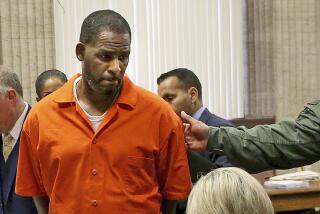Atlantic to Release Campbell’s ‘Banned’ : Rap: ‘We believe in free speech too,’ Atlantic chief Doug Morris says. But the contract doesn’t require distribution of records ‘too rough for us.’
- Share via
Atlantic Records, one of the nation’s most successful record companies, has agreed to release “Banned in the U.S.A.,” the new single by the leader of the controversial rap group 2 Live Crew.
The action means that 2 Live Crew and its leader, Luther Campbell, will be aligned for the first time with a major U.S. record label.
Until now, the group’s records--including “As Nasty as They Wanna Be,” which was declared obscene June 6 by a U.S. District judge in Ft. Lauderdale, Fla.--have been distributed by Campbell on an independent level.
“When I saw Luther Campbell getting put in the back of a police car after a concert, it was a terrible thing,” said Doug Morris, president of the New York-based record company.
“I think all of us in the industry have been a little late in taking a position on this. So when I heard ‘Banned in the U.S.A.,’ I thought it was such a sensational statement that it was important for a major record label to stand behind Luther and say, ‘We believe in the rights of free speech, too.’ ”
Campbell has maintained in interviews that his albums wouldn’t have been removed from hundreds of record stores around the country if he and 2 Live Crew were tied to a major label because that label, with its vast financial and legal resources, could refuse to sell its other albums to those chains in retaliation. Atlantic’s talent roster includes such major sellers as Phil Collins, Debbie Gibson and Robert Plant.
Though no details of the contract were announced, a source close to the negotiations described Atlantic’s “multimillion package” as one of the largest ever for an independent label.
“It’s good to see that major corporations are not afraid to defend the First Amendment,” Allen Jacobi, attorney for Campbell’s company, said Friday in a phone interview from his office in Miami. “It’s a brave step for Atlantic.”
The move, however, was immediately attacked by Florida anti-obscenity crusader Jack Thompson, who engineered the original campaign against Campbell in Florida.
“It’s good news and it’s bad news,” he said in a phone interview Friday. “The bad news is that Atlantic has cast their lot with dirt bags . . . . The good news is Time Warner (which owns Atlantic Records) is a nice, juicy target for a consumer attack.”
Morris said Atlantic’s deal with Campbell is more of a “partnership” than distribution deal. “We’re not bound to distribute everything,” he said. “Some things may be too rough for us, so we will look at the material on a record by record basis.”
The new rap single, a reaction to the legal problems surrounding 2 Live Crew that utilizes the melody of Bruce Springsteen’s “Born in the U.S.A.,” is due to be released Wednesday, the Fourth of July.
The new contract between Atlantic and Luke Records--Campbell’s label--only involves new product, not “Nasty” and other previous albums, Jacobi said.
Meanwhile, a San Antonio, Tex., record store owner has been charged with promotion and sale of obscenity in connection with rap group’s “Nasty” album.
Sgt. Roy Cheatham, a spokesman for the San Antonio Police Department, said Friday that the vice squad filed obscenity charges Thursday night with the city district attorney against Hogwild Records owner Dave Risher after receiving a complaint from a local citizen that Risher sold him a copy of the album that had been declared obscene June 6 by a U.S. District Court in Ft. Lauderdale, Fla.
The misdemeanor complaint was filed June 21 by Patrick Weaver, 20, a local resident and son of Teresa Weaver, the head of a San Antonio organization named Citizens Against Pornography. Weaver’s mother announced her intention to purchase the “Nasty” tape from Hogwild on a local radio talk show prior to the transaction. Weaver couldn’t be reached Friday for comment.
Risher--who had publicly defied recent attempts by local authorities to pressure him to voluntarily remove the “Nasty” album from his store--told The Times on Friday that he believes the police action is politically motivated.
To convict Risher, who vows to continue selling the “Nasty” album as a matter of principle, the state must prove that the “Nasty” album violates Texas state obscenity standards.
More to Read
The biggest entertainment stories
Get our big stories about Hollywood, film, television, music, arts, culture and more right in your inbox as soon as they publish.
You may occasionally receive promotional content from the Los Angeles Times.









